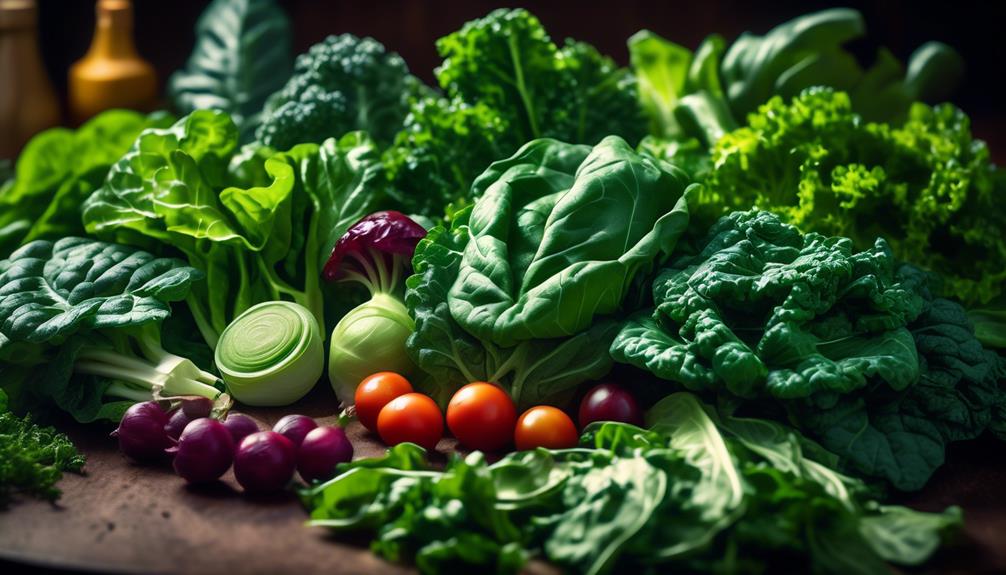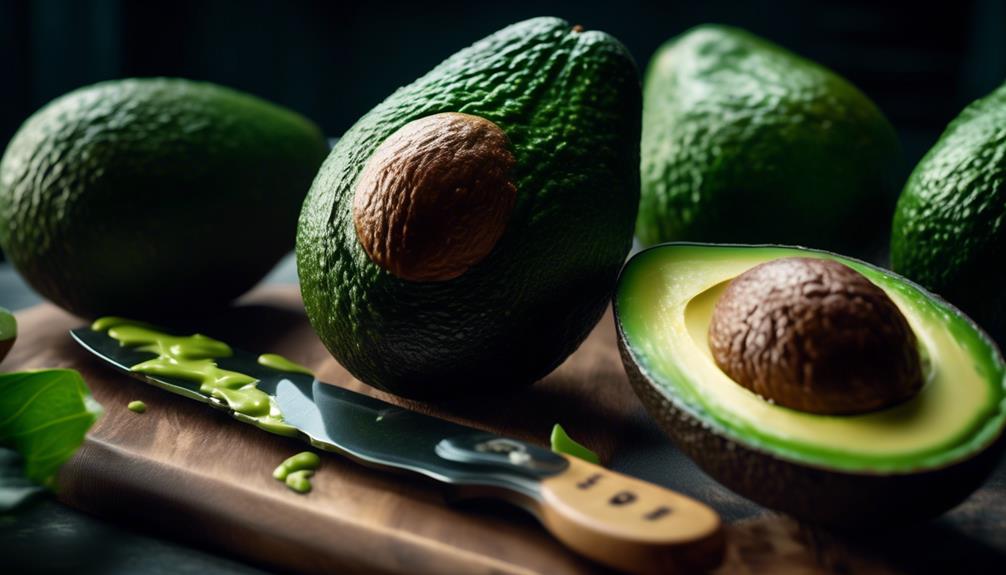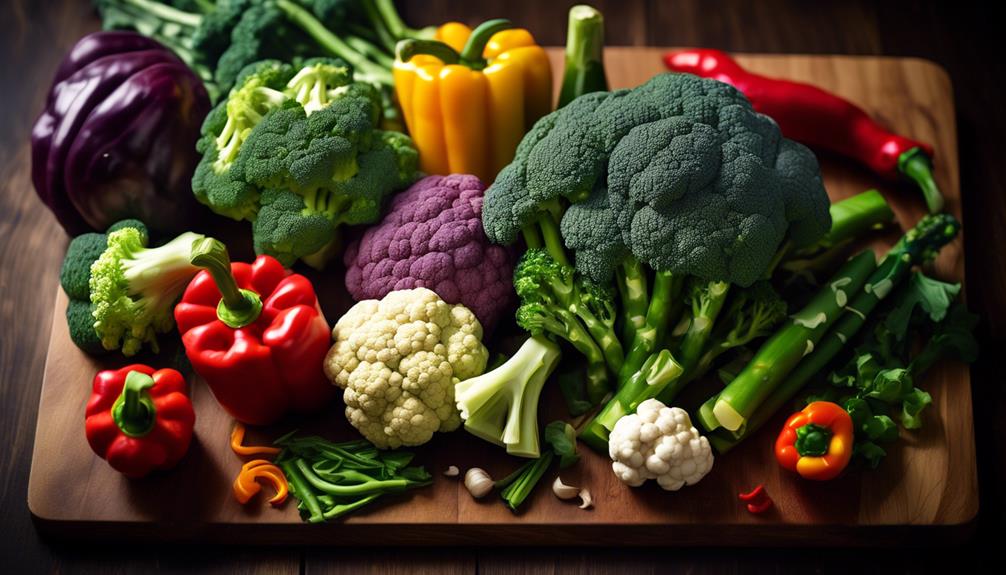Looking to shed those extra pounds on your keto journey? Look no further than these six sensational low-carb vegetables that are sure to elevate your success.
From the crisp crunch of leafy greens to the versatile wonders of avocados, these veggies are not only delicious but also packed with essential nutrients.
But that's not all, there's a secret twist waiting to be unveiled, one that will make you rethink everything you thought you knew about vegetables and their impact on your keto lifestyle.
Are you ready to discover the hidden gem among these top contenders? Get ready to be amazed.
Leafy Greens

To maximize your keto success, incorporating leafy greens into your low-carb diet is highly recommended. Leafy greens aren't only low in carbohydrates but also packed with essential nutrients.
Spinach, for example, is a versatile leafy green that can be incorporated into various keto-friendly recipes. Whether you sauté it with garlic and olive oil or add it to a creamy spinach and feta cheese omelet, spinach provides a flavorful and nutritious addition to your meals.
Kale, another popular leafy green, offers numerous benefits for those following a keto diet. Not only is kale low in carbs, but it's also rich in vitamins A, C, and K. These vitamins play a crucial role in supporting immune function, bone health, and collagen production. Additionally, kale contains antioxidants such as lutein and zeaxanthin, which are essential for maintaining healthy eyesight.
Incorporating leafy greens like spinach and kale into your low-carb diet can provide you with a wide range of health benefits while keeping your carb intake in check. So, next time you're planning your keto meals, don't forget to include these nutrient-dense and delicious leafy greens.
Cruciferous Vegetables
Incorporating cruciferous vegetables into your low-carb diet is a smart move for keto success and overall health. Cruciferous vegetables aren't only low in carbs but also packed with essential nutrients. These veggies belong to the Brassicaceae family and include popular choices like broccoli, cauliflower, Brussels sprouts, and kale.
When it comes to preparing cruciferous vegetables, roasting is a fantastic technique that can enhance their flavors. Roasting these vegetables at a high temperature, around 425°F (220°C), can provide a delicious caramelized taste and crispy texture. To do this, simply toss the vegetables with olive oil, salt, and pepper, then spread them out on a baking sheet and roast for about 20-25 minutes. You can also experiment with adding different spices like garlic powder or paprika for extra flavor.
If you're looking for keto-friendly recipes using cruciferous vegetables, there are plenty of options. One popular choice is roasted cauliflower, which can be seasoned with garlic and parmesan for a savory side dish. Another idea is to make a creamy broccoli soup using low-carb ingredients like coconut milk or heavy cream. Brussels sprouts can also be roasted with bacon and served as a delicious appetizer.
Incorporating cruciferous vegetables into your low-carb diet not only provides essential nutrients but also adds variety and flavor to your meals. Try out different roasting techniques and keto-friendly recipes to enjoy these nutritious veggies while staying on track with your keto goals.
Avocados

Avocados are a fantastic addition to your low-carb keto diet for several reasons. Firstly, they offer a wide range of essential nutrients, including vitamins, minerals, and antioxidants, which can support your overall health.
Secondly, avocados are incredibly versatile and can be used in various dishes, from guacamole to salads and even smoothies.
Lastly, avocados are rich in healthy fats, such as monounsaturated fats, which can help keep you feeling satisfied and provide a steady source of energy throughout the day.
Nutritional Benefits
With their rich, creamy texture and impressive nutrient profile, avocados offer a multitude of nutritional benefits that can support your keto success. Avocados are known for their high nutrient density, meaning they provide a substantial amount of vitamins, minerals, and healthy fats while being relatively low in carbohydrates. This makes them an excellent choice for those following a ketogenic diet.
One of the key benefits of avocados is their ability to aid in weight management. Despite being high in calories, avocados are rich in monounsaturated fats, which have been shown to increase feelings of fullness and reduce appetite. Additionally, avocados contain fiber, which can further support weight loss by promoting feelings of satiety and aiding in digestion.
Incorporating avocados into your low-carb, high-fat diet can provide you with a wide range of essential nutrients and help you achieve your keto goals.
Versatile Cooking Options
To enhance the versatility of your ketogenic cooking, consider exploring the various ways you can incorporate the nutrient-rich and delicious avocado into your meals. Avocados aren't only low in carbs but also packed with healthy fats and fiber, making them an excellent choice for those following a keto diet.
Here are some ideas to inspire your culinary adventures:
- Grilled options: Slice avocados in half and brush them with olive oil before grilling them on high heat. The result is a smoky and creamy treat that pairs well with grilled meats or as a topping for salads.
- Stir fry variations: Add diced avocados towards the end of your stir fry for a creamy and rich texture. They also work well as a replacement for higher-carb ingredients like rice or noodles.
These cooking methods bring out the natural flavors of avocados while adding a unique twist to your keto meals. So go ahead and get creative with this versatile fruit!
High in Healthy Fats
Incorporating avocados into your ketogenic diet can help boost your healthy fat intake while adding a delicious and creamy element to your meals. Avocados are packed with monounsaturated fats, which are considered to be healthy fats. These fats have been shown to lower bad cholesterol levels and reduce the risk of heart disease.
Additionally, avocados contain a good amount of fiber and are low in net carbs, making them a perfect keto-friendly option. They're also rich in vitamins and minerals, including potassium, vitamin K, vitamin E, and vitamin C.
Whether you enjoy them as a spread on your keto-friendly bread or as a topping for your salads, avocados are a versatile and nutritious addition to your ketogenic diet.
Bell Peppers

When it comes to low-carb vegetables for keto success, bell peppers are a great choice. These vibrant vegetables offer a range of health benefits, including high amounts of vitamin C and antioxidants.
Bell peppers can be enjoyed raw in salads, stuffed, or cooked in various dishes, making them a versatile option for adding flavor and color to your meals. Plus, they're low in carbs and calories, making them an excellent choice for those following a keto diet.
Health Benefits
Bell peppers offer numerous health benefits that make them an excellent addition to a low-carb ketogenic diet. Here are a few reasons why you should consider including bell peppers in your low-carb recipe ideas:
- Low in carbs: Bell peppers are low in carbohydrates, making them a great choice for those following a low-carb diet. They can be a tasty and colorful addition to your meals without adding unnecessary carbs.
- High in nutrients: Bell peppers are packed with essential vitamins and minerals. They're particularly rich in vitamin C, which is important for immune function and collagen production.
- Weight loss benefits: Bell peppers are low in calories and high in fiber, which can help you feel full and satisfied. Including them in your meals can support weight loss efforts and help you reach your goals.
Cooking Methods
To enhance the flavors and textures of bell peppers, there are various cooking methods you can explore.
When it comes to sautéing vs. roasting, sautéing bell peppers in a little oil over high heat can help retain their crispness and bring out their natural sweetness.
On the other hand, roasting bell peppers in the oven can intensify their flavors and give them a smoky taste.
If you prefer a lighter cooking method, steaming is a great option. Steamed bell peppers retain their vibrant color and maintain their crunchiness while becoming slightly tender.
For those who enjoy a charred and smoky taste, grilling bell peppers is the way to go. Grilled bell peppers develop a rich flavor and a delicious smoky aroma that adds depth to any dish.
Nutritional Value
One important aspect to consider when discussing bell peppers is their nutritional value. Bell peppers aren't only low in carbs but also packed with essential nutrients. Here are some key nutritional benefits of bell peppers:
- Rich in vitamins: Bell peppers, especially the red ones, are a great source of vitamins A, C, and B6. These vitamins play a crucial role in supporting your immune system and promoting healthy skin.
- High in antioxidants: Bell peppers are loaded with antioxidants, such as beta-carotene and quercetin, which help protect your cells from damage caused by free radicals.
- Fiber content: Bell peppers are a good source of dietary fiber, which aids in digestion and helps you feel full longer.
To incorporate bell peppers into your low-carb meal planning, consider adding them to stir-fries, salads, or even roasting them for a delicious side dish. Their vibrant colors and mild flavor make them a versatile ingredient in various keto-friendly recipes.
Zucchini

Zucchini is a versatile and nutrient-rich low-carb vegetable that can be enjoyed in a variety of delicious keto-friendly recipes. Whether you're looking to add more vegetables to your diet or simply want to explore new flavors, zucchini is a great choice.
Not only is it low in carbs, but it also offers a range of health benefits. One of the greatest advantages of zucchini is its versatility in cooking. From zucchini noodles to stuffed zucchini boats, there are countless zucchini recipes that can be easily incorporated into a keto diet. Its mild flavor and ability to take on different seasonings make it a perfect ingredient for various dishes.
In addition to being low in carbs, zucchini is also packed with essential nutrients. It's a good source of vitamins A and C, as well as potassium and folate. These vitamins and minerals play a crucial role in supporting overall health and well-being.
Furthermore, zucchini is rich in antioxidants, such as carotenoids and flavonoids, which help protect the body against cellular damage caused by free radicals. These antioxidants have been linked to a reduced risk of chronic diseases, including heart disease and certain types of cancer.
Incorporating zucchini into your keto diet not only adds variety to your meals but also provides numerous health benefits. So, don't hesitate to explore the world of zucchini recipes and enjoy the delicious flavors it brings to your low-carb lifestyle.
Cauliflower
Cauliflower is a versatile and nutrient-rich low-carb vegetable that can be a great addition to your keto diet. Here are three reasons why you should consider including cauliflower in your meals:
- Low in carbohydrates: With only 3 grams of net carbs per cup, cauliflower is an excellent choice for those following a keto diet. It can be used as a substitute for higher-carb ingredients like rice, potatoes, or even pizza crust.
- Rich in nutrients: Despite its low carb content, cauliflower is packed with essential vitamins and minerals. It's a good source of vitamin C, vitamin K, folate, and potassium, which are important for overall health and wellbeing.
- Versatile and delicious: Cauliflower can be prepared in numerous ways, making it a versatile ingredient in your keto recipes. From cauliflower rice and mashed cauliflower to cauliflower pizza crust and buffalo cauliflower bites, the possibilities are endless. These recipes allow you to enjoy your favorite dishes while keeping your carb intake low.
Incorporating cauliflower into your keto diet not only provides you with essential nutrients but also adds variety and flavor to your meals. So why not give these cauliflower recipes a try and enjoy the benefits it brings to your keto success?
Conclusion
In conclusion, incorporating low-carb vegetables into your keto diet is a smart choice for success.
Leafy greens like spinach and kale provide essential nutrients while being low in carbs.
Cruciferous vegetables such as broccoli and cauliflower offer fiber and antioxidants.
Avocados are a creamy and satisfying option packed with healthy fats.
Bell peppers and zucchini add color and flavor to your meals without adding many carbs.
So, just like a refreshing breeze on a hot summer day, these low-carb vegetables can help you enjoy your keto journey to the fullest.







